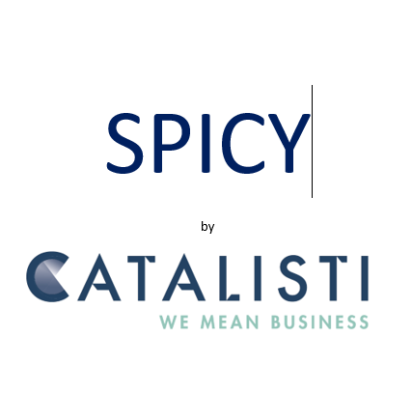Sugar-based chemicals and Polymers through Innovative Chemocatalysis and engineered Yeast
The main aim of SPICY is to provide chemical industry with new or optimized processes to convert sugars into added value compounds, i.e. both drop-ins and novel biobased chemicals. Two complementary lines are hereto developed in parallel:
- The biotechnological route, with improved yeast-strains targets 3 molecules: Lactic acid (LA), 2,3-Butanediol (2,3-BDO) and Muconic acid (MA)
- In the chemocatalytic routes, sugars will lead to: Lactate esters, Acrylic acid (AA), Llevulinic acid (LEV), 2-pentenoic acid (2-PA) and Hexadienes (HD).
Both will aspire to meet industrial standards of productivity, titer, yield, and selectivity, to safeguard potential economic benefit and future industrial valorization. Most of the target chemicals are (potential) monomers for biobased plastics. Hence, the second aim of SPICY is to deliver proof-of-concept of their usefulness by targeting novel and functional polymeric materials, typically not found in the current oil-based valorization chain. The innovation is thus to be achieved both in terms of processes and products in the context of furthering the Flemish biobased value chain.
Furthermore, unsaturated acids will be converted to unsaturated nitriles with acetonitrile (AN) as the main target and 2,3-BDO will lead to butadiene (BD). The focus will be on increasing yields and new processes involving inventive catalysts.
Finally in targeting novel and functional polymeric materials (exploration, proof-of-concept based):
- Flow chemistry protocols will screen the polymerizability of the above produced disubstituted unsaturated acids/esters and their nitriles
- A MA polymer platform will be established, exploring the versatile nature of this molecule
- A library of HD-based homo- and co-polymer rubbers will be assembled
- An assessment will be done of the impact of impurities of the above production processes on the polymerization protocols and their sensitivity to lookalike side-products
- A material property screening of all (co)polymer products derived in the above points, benchmarked versus the closest resembling oil-based polymer available
A catalogue will be delivered at the end, containing info on every new (co)polymer that was successfully made with chemical/thermal properties.
SPICY aims at creating a new and profitable value chain in the Flemish bio-economy by connecting sugar feedstock suppliers with fermentation-based and chemical biorefinery companies to end-users active in chemical and polymer production (see below: Advisory Board).
ACTIVITIES of Bio Base Europe Pilot Plant
- BBEU will develop and optimise the fermentation and downstream purification process for the renewable chemicals 2,3 butanediol and muconic acid (lactic acid to be confirmed).
- Sufficient material within required specifications will be produced within industry relevant context to develop and validate the chemo-catalytic conversion downstream.
- Process data will be collected to perform a first techno-economic assessment and life cycle analysis.
ADVISORY BOARD
- Sugar producers: Tiense Suiker, Cargill, Tereos
- Yeast technology: Global Yeast
- Biorefinery: Galactic, GFBiochemicals
- Chemicals: Eastman, 3M, Allnex, Proviron, Solvay
- Materials and textile: Beaulieu
- Polymers: INEOS styrolution, EOC
PARTNERS
- Bio Base Europe Pilot Plant, BE
- KU Leuven
- VITO, BE
- VIB, BE
- Universiteit Gent – Department of Materials, Textiles and Chemical Engineering (MATCH), BE
- Universiteit Hasselt – IMO – IMOMEC, BE
SUPPORTED by:



 webdesign
webdesign